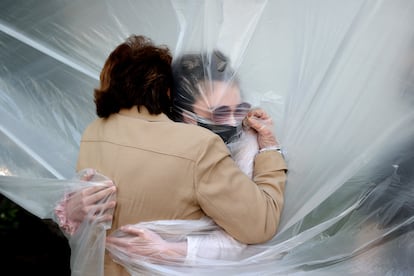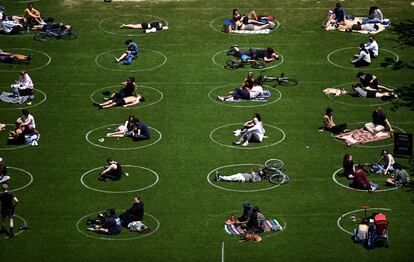Living in a world that we had never imagined
On March 11, it will be a year since the World Health Organization designated the coronavirus health crisis as a pandemic. In this essay, writer Siri Hustvedt reflects on what we have learned since then

Almost a year has passed since the World Health Organization declared the swiftly spreading coronavirus a pandemic on March 11, 2020. As vaccines offer hope for an end to the viral carnage, how should we imagine the future, as a return to the “normal” past or as something else?
I , who have not lost a close person to the virus, who have always worked at home, whose life has changed far less dramatically than most people’s, have nevertheless felt as if time has taken on another quality, as if I am living in a state of suspended animation like a hibernating animal, although I am fully conscious and still writing every day. Life’s punctuation, the comings and goings, the dinners out, the meetings, conferences, travels, our family Christmas all came to an abrupt end, and Zoom, for which I am grateful, is not a substitute. Without temporal markers, days and nights run together to become an undifferentiated soup in the mind. But there is something else, too, a sense that a tragic alteration has taken place in the fabric of reality, which has made it difficult for me to imagine what the other side of the pandemic will look like. The fantasy of the future is built from memory, but suddenly my memories seem inadequate to the task.
Death happens to all of us, but the threat of death from an invisible global plague has exposed our vulnerability as a species, our startling dependence on one another to get through a single day – for food, water, heat, medicine and much more – and the fragility of the planet as whole in a geological age now called the Anthropocene, a period when human beings have become the dominant influence on both the climate and the environment. In other words, the future is in human hands, and it is hard to inhabit a world we haven’t imagined.
I think we should remember this time as one of collective trauma. Countless people around the globe have lost parents, spouses, siblings, children and dear friends, and they were not allowed to hold or touch their beloveds as they lay dying. The ache of that forced separation does not vanish. My mother died in October 2019. I am intensely grateful she did not die a year later. Mourning, which once had a public face in the West, instantly recognizable in the clothing of the bereaved, has become mostly personal in our era, as if grief is a social embarrassment, or worse, a pathology, and should remain hidden until people “get over it.”

It seems it is harder to collectively grieve the viral dead than those lost in wars or brutal attacks, such as September 11, 2001 in the United States, when the agents of destruction are human. I recall the spontaneous memorials that sprang up all over New York City, the kindness of strangers to one another, and the compassion expressed by other countries for us. New York now has its moving memorial to the dead. The pandemic of 1918, however, that killed 50 million people, vanished from global memory into almost total amnesia. Notably, there is a memorial to the flu dead in New Zealand, erected in 2017. Twenty-six people have died in that country from Covid-19.
The virus is still raging and mutating. It is now the number-one cause of death in the United States. Over half a million have died here, a number approaching the 675,000 lost to influenza in 1918. And yet, the effects of Covid-19 around the world have been lopsided. Authoritarian governments such as China’s and Singapore’s have succeeded in controlling the virus. Strong-arming the population and blasting them with propaganda can be effective. A deeper reason, however, may be trust. According to the online site Statista, in 2020, 82% of the Chinese trusted their government to do what is right, a decline from the year before, probably due to the authorities’ handling of the pandemic. In Norway, where testing and tracking have been widespread and efficient, where more than 60% of its inhabitants say other people and the government can be trusted, where income inequality is far less egregious than in many developed countries (the United States, the United Kingdom and Spain, to give three examples), 620 people have died of the virus in a population of 5.5 million.

In the much larger and far more diverse United States, healthcare is not a social right. Income inequality has been growing since the 1970s, as have levels of distrust in other people and distrust in the government. The exact definition of trust is controversial, but it describes relations among people within a social contract founded on repetition and habit over time. I turn on the tap. I expect water to come out. I implicitly trust all those responsible for providing clean water to the citizens of the city where I live. If the water is poisoned by lead, my prediction is proven wrong, and my trust is dashed. The pandemic has shaken the expectations of many, not just in the US, and fueled a distrust and anger at invisible power that has been festering for decades.
Think of the people who have survived the illness but have sustained lasting damage to their organs – lungs, hearts, and brains – or suffer from mysterious symptoms that can’t be traced to any known cause. Too little is known about the long-term effects of the virus to predict what lies ahead for them. Think of others who have lost their livelihoods for good. By one estimate Covid-19 has pushed 100 million people into extreme poverty, which is defined as living on $1.90 a day. The United States has eight million newly poor people. Incidents of what academics call “intimate partner violence,” which most often (but not exclusively) mean men beating up women at home, have increased, as have the number of couples, who, locked up together for months, realize they can’t abide each other’s company and file for divorce or break up. Their past experience had not prepared them for the trials of continual intimacy.
Women, already strained by domestic and childcare responsibilities on top of paying jobs, have seen the delicate daily machinery of their lives break to pieces. And loneliness, once interrupted by routine visits to friends, going to the theater and museums, and casual or serious erotic encounters, has become an enforced state of being. Isolation has been linked to depressed immune function, chronic inflammation, as well as numerous psychiatric illnesses. Think of all the people who live alone.
We are aware of the depths of the crisis in part because we inhabit a world of big data. Statisticians have been busy counting the pandemic dead. They have been measuring abstractions such as trust and confidence for years through questionnaires, after which they subject those measurements to complex mathematical calculations. The pandemic has seen an explosion in the number of charts and graphs depicting our losses. Epidemiology is all data. The epidemiologist rarely looks into the face of an actual patient. We need epidemiologists, especially in a pandemic, to analyze the data and suggest methods for curtailing the virus. But it is wise to note that there is no mourning by numbers, and the effect of one bewildering graph after another with its spikes and plateaus and dips may be that they estrange us from the human suffering the spikes represent. They fit nicely into a culture that hides the realities of death.
An illusion of control may accompany our faith in data as well. A mastery of the facts brings comfort even when that knowing offers no solution. Data must be gathered. There are many places in the world that have no data on trust, for example. Data is never complete, and it can be wrong, which is not to say we should abandon data collection but rather that statistics should occupy a place in the world that is not one of blind faith. I am not sure I trust the Chinese numbers on trust. Might there not be some incentive to lie when answering questions in an authoritarian state? What is clear is that offering human beings statistics, however expertly devised, is inadequate when what used to be does not tell us what will be. Forms of collective sustenance are badly needed. All over the world, people stood on balconies or on front steps, banged on pots and pans, cheering for healthcare workers. The expression of gratitude was also a way to breach our forced isolation, express communal solidarity, and recognize how badly we need others in our lives, not just people we know but those we don’t know.

A loss of faith in government, expertise, science, and in intellectuals in general has escalated. Fear of vaccines demonstrates distrust in the medical powers-that-be, sometimes for strong historical reasons (the forced sterilization of vulnerable groups in many countries). But vaccines for infectious illness cannot protect the population if large numbers of people refuse them. The motivation must be communal as well as personal. Wild conspiracy theories thrive in times when our expectations for the future based on the past no longer hold. A recent example: tracking microchips are being injected into people’s arms along with doses of the vaccine. It may be easier to believe in a cabal of evil elites secretly controlling millions through technology than an invisible virus that invades the body, no needle required. These stories often have an apocalyptic character. Good and evil are pitted against each other in a battle to the finish. There is no future because the spectacular end is near.
The fact that these stories seem to thrive particularly well in countries where the power of community, institutions and unions have been steadily eroded for years should tell us something about human needs. Joining the crusading angels brings with it a potent group feeling in a fragmenting society. To tell people in the grip of these fantasies that they should look at an epidemiological chart and believe the scientists will not fix what ails them.
Fires are burning. Ice is melting. Waters are rising. The unprecedented loss of biodiversity due to humanity’s shortsighted hunger for greater and greater profits, no matter what the consequences, has increased the risk of infectious zoonotic disease. The world is frightening, and it is easy to give way to despair, to be crushed by the numbers, to succumb to torpor and an altered sense of time, but this too is a form of apocalyptic thinking, and it personalizes a crisis that belongs to all of us on the planet. Let us not forget the dead and let us not forget our failures and successes during the pandemic because they will help us imagine a future and act together to create it.
Siri Hustvedt (Minnesota, 1955) is a writer, essayist and poet, and won Spain’s Princess of Asturias prize for literature in 2019.